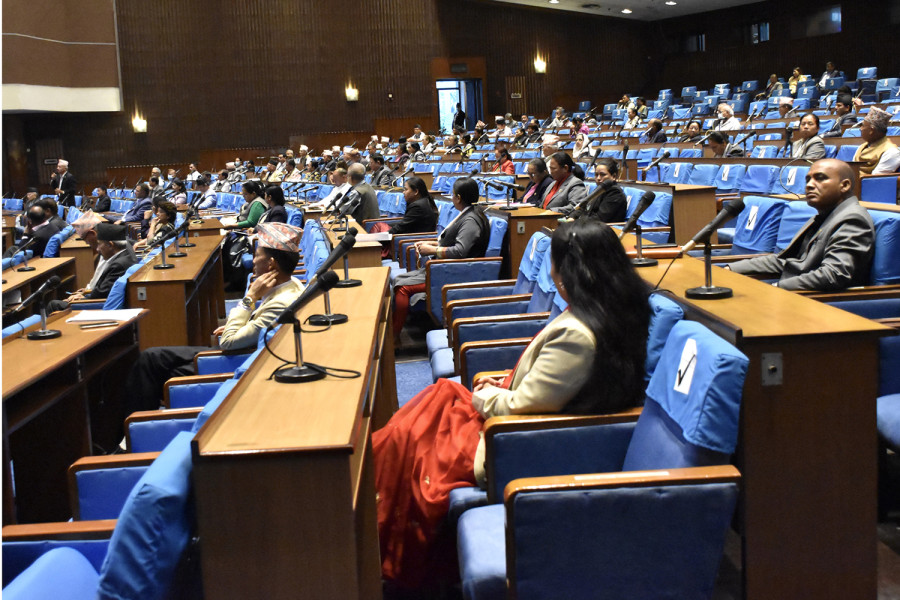National
Lawmakers warn government against joining State Partnership Program
Congress lawmaker Gagan Thapa vows to scuttle any attempts aimed at signing the programme.
Post Report
Lawmakers from various parties, including the ruling parties, have questioned whether the United States government was pressuring the Nepal government to sign its State Partnership Program (SPP).
At a meeting of the House of Representatives on Wednesday, they demanded the government clarify the issue in Parliament, saying they stand against military partnership of any kind with any country. The much talked about SPP has triggered a fresh debate in the political and intellectual circles in Nepal.
Speaking during special time in the lower house, Nepali Congress General Secretary Gagan Thapa demanded that Prime Minister Sher Bahadur Deuba clarify to the parliament about the programme and ensure Nepal will not sign it.
“The incumbent prime minister is also the president of my party. Nepal was never in favour of serving the strategic interest [of any country]. Nor is it now. So my understanding is the prime minister also shares the same view,” said Thapa.
“I would like to request him to present his views clearly today. What the US wants is up to it. What we should do… the prime minister should let us know.”
When it comes to strategic issues, Nepal must tread carefully, he said.
“When there are strategic interests, we should stay away from powerful countries. This is not just my opinion; our constitution also says the same,” Thapa added. “My party, the Nepali Congress, also has the same views.”
Thapa said the parliament ratified the Millennium Challenge Corporation Nepal Compact, a development pact, and Nepal is always open to such types of agreements.
However, no partnership that involves Nepal Army will be accepted, be it with the neighbouring countries or with the powerful nations, he said.
Thapa played an instrumental role in bringing the ruling parties together for the ratification of the MCC Nepal Compact. The CPN (Maoist Centre) and the CPN (Unified Socialist) that once stood fiercely against the compact agreed for its ratification at the final hours, treading a middle path to endorse it with an interpretative declaration.
Unlike the MCC compact, “the SPP is not a development agreement,” Thapa said. “Nepal must not sign it. We will scuttle any attempt to accept it.”
In the same meeting, lawmakers from the main opposition CPN-UML said accepting the SPP could lead to a geopolitical conflict. They warned the government to be careful about the consequences of signing the SPP.
“Signing the SPP will push the country into a geopolitical conflict… it is unacceptable,” said UML leader and former foreign minister Pradeep Gyawali. “The draft proposal of the SPP has raised serious concerns. If Nepal decides to be part of any military alliance, it will be in breach of Nepal’s foreign policy.”
Stating that the proposal for signing the SPP was made during the tenure of the KP Sharma Oli government in 2015, he said it was kept on hold for studying. He was foreign minister then.
The SPP issue has surfaced just ahead of the visits of Prime Minister Sher Bahadur Deuba and Chief of Army Staff General Prabhu Ram Sharma to the United States.
Sharma is scheduled to visit the US at the invitation of the Pentagon from June 27 to July 1 while Prime Minister Deuba is visiting Washington in mid July, of which a formal announcement is yet to be made.
Gyawali also demanded clarification from the government on the issue.
Although Deuba wasn’t available for clarification, Minister for Law, Justice and Parliamentary Affairs Govinda Sharma Bandi claimed that the Nepal government hasn’t received a proposal to sign the SPP between the Nepal Army and the United States National Guard.
Answering the concerns from the lawmakers in the lower house, he rubbished the claim that the US was pushing Nepal to sign the deal. “The Nepal government hasn’t invited the State Partnership Program. Neither it has forwarded any proposal for it nor has it received one,” Bandi said in Parliament. “Let me make it very clear. This is just a rumour targeted at defaming the government.”
The US had launched the concept of the SPP in 1993 as a humanitarian and disaster response training programme.
Prem Suwal, Nepal Majdoor Kisan Party lawmaker, said the SPP allows the American army not just to enter Nepal but also capture the barracks of Nepal Army. “The American Army will enter Nepal with arms and vehicles and carry out whatever activities it wants,” he said. “The parties in the government are gradually allowing the external forces to rule over Nepal.”
Bandi dismissed the claim saying no foreign army can enter the sovereign nation. “I urge everyone not to run after such illusions,” he said.




 18.12°C Kathmandu
18.12°C Kathmandu













